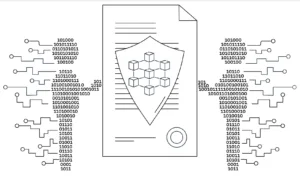Blockchain technology is a decentralized, shared, immutable ledger that facilitates recording transactions and data from peer-to-peer networks. It ensures security, transparency, and invariability of the data.
When you use blockchain to make a transaction, the information is very safe. The blocks that make up the transaction cannot be changed unless the network confirms it. This means that nobody can hack or change the data.
Blockchain technology is best known for its significant role in cryptocurrency systems and solutions such as Bitcoin, Ripple, or Ethereum for maintaining a decentralized and secure transaction record. Its applications are, however, not limited to cryptocurrency.
Though blockchain technology is still in the early developmental stage, it can revolutionize several sectors, such as healthcare, finance and banking, cybersecurity, entertainment, education, information and communication technology, media and entertainment, travel, retail, and government.
Businesses and industries are steadily becoming aware of the advantages of blockchain technology, which include enhanced security, greater transparency, instant traceability and auditability, and better speed and efficiency. Following is a detailed overview of the usage of blockchain technology across various verticals.
Blockchain Technology-Healthcare & Pharmaceutical Industry:
Blockchain technology has the potential to revolutionize the healthcare and pharmaceutical sectors. Healthcare centres such as hospitals, clinics, ambulatory surgical centres, and blood banks widely use it to secure patient data, transactions, and other accessories. The growth of cloud-based applications, digital technology, and the increasing popularity of cryptocurrencies like Bitcoin and Ethereum are expected to generate more revenue due to identity and data theft incidents.
Data generated at healthcare centres is vast and is highly prone to breaches and cyberattacks. Blockchain technology is one of the most reliable and user-friendly solutions for these challenges.
Many healthcare centres, research institutes, and pharmaceutical units rely on advanced blockchain solutions to strengthen data defence, securely transfer patient medical records, and manage the medicine supply chain.
Blockchain Technology-BFSI Sector:
The Banking, Financial Services and Insurance (BFSI) sector is rapidly expanding due to rising per capita income, growing consumer awareness regarding financial products, novel product launches, and expanding distribution. Many financial institutions, including commercial banks, non-banking financial companies, cooperatives, insurance companies, pension funds, and smaller financial entities, use blockchain technology to store and transfer sensitive financial information securely. This helps to reduce the likelihood of fraud and corruption within the industry. It helps to increase overall efficiency and safety and creates novel products and services like decentralized finance and tokenized assets.
Blockchain also helps streamline and automate financial processes such as payments, trade finance, and compliance, reducing overall costs within banks and clearinghouses.
Travel and Tourism Industry:
The travel and tourism sector relies on various companies for flight, hotel & resort bookings and financial transactions. This requires the transfer of customer information and personal belongings. Blockchain solutions can help streamline the settlements among travel agents, third-party vendors, and hotels.
Travel and tourism companies use blockchain technology for secure, traceable bookings and payments, identification services and biometrics, supply chain management, and reduced possibilities of fraud in travel insurance.
Moreover, it helps to track customer luggage and enhance tourism data and analytics.
Media & Entertainment Industry:
The media and entertainment industry primarily operates on legacy systems and business models. It often faces challenges like lack of transparency and data theft, threats to media channels, copyright and piracy issues, and licensing requirements. Many companies are adopting blockchain products and services early to address these hurdles.
Blockchain in the media and entertainment sector can help manage digital rights, monetization, and tokenization of films, music albums, and art, improve content curation and recommendation, and enhance transparency in streaming and distribution platforms.
Education Sector:
Though the education sector has been rapidly evolving over the recent past, one of the key challenges that every educational institution faces is to collect, store, and analyze data of each student. This data usually includes student portfolios, academic progress, and learning outcomes. To cater to these issues, educational institutes are investing in blockchain technology. Blockchain technology can help in the credential verification of students, store and manage student records, automate administrative processes, and manage financial aid, grants, and scholarships.
Blockchain Technology Market Scenario:
Blockchain technology is becoming popular in various sectors as it secures transactions and payments, improves traceability, and reduces compliance costs.
Due to identity and data theft incidents, cloud-based applications, digital technology, and growing cryptocurrencies such as Bitcoin and Ethereum are expected to generate more revenue.
Manufacturers and leading key players in the blockchain technology market heavily invest in R&D activities to develop and launch novel and innovative blockchain solutions. For instance, in August 2020, Oracle, a US multinational computer technology company, launched a blockchain service for small- and large-scale enterprises.
Indian Oil, Certified Origins, Neurosoft, Arab Jordan Investment Bank, and Sofbang are some early adopters of Oracle’s blockchain platform. In addition, in June 2023, Fujitsu Limited recently announced the launch of blockchain collaboration tech to build Web3 services.
You May Also Like to Read:



